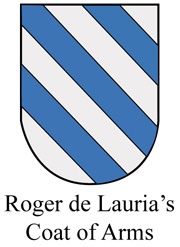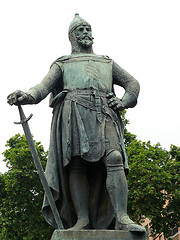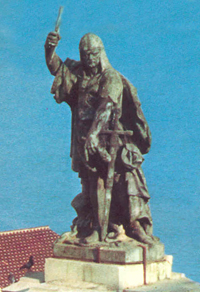It can be justifiably claimed that Roger of Lauria was one of the greatest naval commanders in history, while also being the most underrated and unrecognized admirals. In the course of his career he would not loose a single naval battle despite being repeatedly out-manned and out-numbered.
Roger of Lauria was born in Lauria sometime around 1250 and as the son of
the Baron Lauria he would have inherited some twenty-four castles in Calabria
except for their confiscation by Charles of Anjou following the revolt in 1266.
With the death of his father at the Battle of Benevento in that
some twenty-four castles in Calabria
except for their confiscation by Charles of Anjou following the revolt in 1266.
With the death of his father at the Battle of Benevento in that
 year, Roger had
fled Calabria with his family to the Aragonese court where he appears to have
flourished. Roger grew up with
Peter III and Conrad of Lancia, and formed bonds
with them that lasted a lifetime. Roger, despite being a foreigner,
was known for his beautiful command of the
Catalan language. Given extensive holdings in Valencia, Roger
was in a position to demonstrate his abilities when the mudéjars revolted in
1275. Roger's performance in carrying out his duties must have impressed James
I, for in October of 1278 he was appointed to act as procurator general for
Valencia in the absence of Jiménez of Luna who was required to be at court.
year, Roger had
fled Calabria with his family to the Aragonese court where he appears to have
flourished. Roger grew up with
Peter III and Conrad of Lancia, and formed bonds
with them that lasted a lifetime. Roger, despite being a foreigner,
was known for his beautiful command of the
Catalan language. Given extensive holdings in Valencia, Roger
was in a position to demonstrate his abilities when the mudéjars revolted in
1275. Roger's performance in carrying out his duties must have impressed James
I, for in October of 1278 he was appointed to act as procurator general for
Valencia in the absence of Jiménez of Luna who was required to be at court.
On April 20, 1283 Peter III appointed Roger of Lauria to the 'office of admiral of the Kingdom of Catalonia, Valencia and Sicily.' (A 19th century statue in Barcelona of Roger to the left). The appointment states he was to exercise both civil and criminal justice for all men in the fleet 'as much on the sea as on the land' and was to have all the rights of his predecessors. Because of the maritime traditions and institutional history of Sicily, the office of admiral for the Crown of Aragon under Roger would become more influential and powerful than at any other time in its history. It was fortunate for Peter III and his successors that he had the foresight to place such a capable commander in the position.
At the time of his appointment as admiral Roger had obvious experience in land warfare, but little in maritime matters. The chronicles are virtually silent about Roger's activities in preparation of the fleet or its early operations in North Africa and Sicily, nor is he mentioned in orders for arming the fleet in 1282. Peter III would appoint him governor of the naval base of Reggio on February 14, 1282, a day after Charles of Anjou was forced out. However, if there were any concerns in regards to his abilities as a naval commander, those were put to rest after the Battle of Malta.
 Roger would fight a series of classic naval battles against the Angevins,
French and Genoese during the course of the War of the Sicilian Vespers: Battle
of Malta (June 8, 1283), Battle of Naples (June 5, 1284),
Battles of Las Formigueras and Las Rosas (September 4-5, 1285),
and the Battle of the Counts
(June 23, 1287). He would also lead a spectacular raid into the Aegean Sea in
1292. However, in 1295 because of the Treaty of Anagni, the Catalan-Aragonese
fleet left Sicily. (Picture to the right is of a 20th century statue of Roger de
Lauria at Tarragona).
Roger would fight a series of classic naval battles against the Angevins,
French and Genoese during the course of the War of the Sicilian Vespers: Battle
of Malta (June 8, 1283), Battle of Naples (June 5, 1284),
Battles of Las Formigueras and Las Rosas (September 4-5, 1285),
and the Battle of the Counts
(June 23, 1287). He would also lead a spectacular raid into the Aegean Sea in
1292. However, in 1295 because of the Treaty of Anagni, the Catalan-Aragonese
fleet left Sicily. (Picture to the right is of a 20th century statue of Roger de
Lauria at Tarragona).
While the Aragonese fleet had been withdrawn from Sicily, Roger had remained at the court of Frederick III along with John of Procida. Both James II and the pope had been trying to entice them away from Sicily, Roger in particular. Roger clearly did not want to fight for the Angevins. In a letter to James II he stated that to do so would dishonor them both. While the papacy had offered Roger land and money, James was more direct and to the point. In a letter dated January 16, 1296 James thanked Roger for his past services to the royal family, confirmed his position as Admiral of the Crown of Aragon, but warned him that if he should refuse to return to the service of Aragon the king would move against all of his holdings and his family. Because of his family's position in Valencia and his loyalty to the House of Aragon, Roger would leave Sicily in 1296. He would be vilified by Sicilian writers as a traitor, but in fact he betrayed no one by remaining loyal to the house of his benefactor and to his boyhood friend Peter III.
Because of the Treaty of Anagni (June 12, 1295), Roger was forced to fight against the Sicilians, a situation it seems clear he did not enjoy. He would defeat the Sicilian fleet at the Battle of Cape Orlando (July 4, 1299) and again at the Battle of Ponza (June 14, 1300).
Unlike many of his contemporaries, he never allowed himself to be badgered into unwise decisions by kings or his subordinates. He was unusual for attacking the enemy at night and his use of subterfuge to lure the enemy into tactically inferior situations. However, Roger should also be remembered for his organizational skills. As admiral of the fleet he controlled the Office of the Admiral, which had control over the finances, arsenals, recruitment, pay, arming and maintenance of the entire fleet. Unlike his Angevin opponents, Roger had only limited resources to work with. Had he misused or misallocated those resources the war could have turned out substantially different.
Following the war, Roger fell out of favor with James II due to the political machinations of the previous admiral James Perez and his former vice-admiral Bernard Sarría, who became admiral of the Crown of Aragon. Roger returned to Valencia. However, when James II and the papacy decided to mount another campaign against 'Romania' they turned to Roger. Roger was preparing the expedition against the Byzantine Empire when he died of natural causes on January 17, 1305. As per his will, he was buried at the feet of his benefactor and close friend Peter III at the Monastary of Santes Creus.
To learn more about Roger of Lauria and his management of the Office of the Admiral see: Sea Power in the Medieval Mediterranean: The Catalan-Aragonese Fleet in the War of the Sicilian Vespers.

